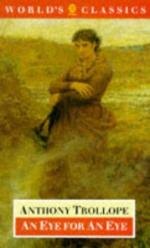was an Englishwoman, though a Catholic; but she had
been left early an orphan, and had been brought up
in a provincial town of France by her grandmother.
There she had married a certain Captain O’Hara,
she having some small means of her own sufficient to
make her valuable in the eyes of an adventurer.
At that time she was no more than eighteen, and had
given her hand to the Captain in opposition to the
wishes of her only guardian. What had been her
life from that time to the period at which, under
Father Marty’s auspices, she became the inhabitant
of Ardkill Cottage, no one knew but herself. She
was then utterly dissevered from all friends and relatives,
and appeared on the western coast of County Clare
with her daughter, a perfect stranger to every one.
Father Marty was an old man, now nearly seventy, and
had been educated in France. There he had known
Mrs. O’Hara’s grandmother, and hence had
arisen the friendship which had induced him to bring
the lady into his parish. She came there with
a daughter, then hardly more than a child. Between
two and three years had passed since her coming, and
the child was now a grown-up girl, nearly nineteen
years old. Of her means little or nothing was
known accurately, even to the priest. She had
told him that she had saved enough out of the wreck
on which to live with her girl after some very humble
fashion, and she paid her way. There must have
come some sudden crash, or she would hardly have taken
her child from an expensive Parisian school to vegetate
in such solitude as that she had chosen. And
it was a solitude from which there seemed to be no
chance of future escape. They had brought with
them a piano and a few books, mostly French;—and
with these it seemed to have been intended that the
two ladies should make their future lives endurable.
Other resources except such as the scenery of the
cliffs afforded them, they had none.
The author would wish to impress upon his readers,
if it may be possible, some idea of the outward appearance
and personal character of each of these two ladies,
as his story can hardly be told successfully unless
he do so. The elder, who was at this time still
under forty years of age, would have been a very handsome
woman had not troubles, suffering, and the contests
of a rugged life, in which she had both endured and
dared much, given to her face a look of hard combative
resolution which was not feminine. She was rather
below than above the average height,—or
at any rate looked to be so, as she was strongly made,
with broad shoulders, and a waist that was perhaps
not now as slender as when she first met Captain O’Hara.
But her hair was still black,—as dark at
least as hair can be which is not in truth black at
all but only darkly brown. Whatever might be its
colour there was no tinge of grey upon it. It
was glossy, silken, and long as when she was a girl.
I do not think that she took pride in it. How
could she take pride in personal beauty, when she




